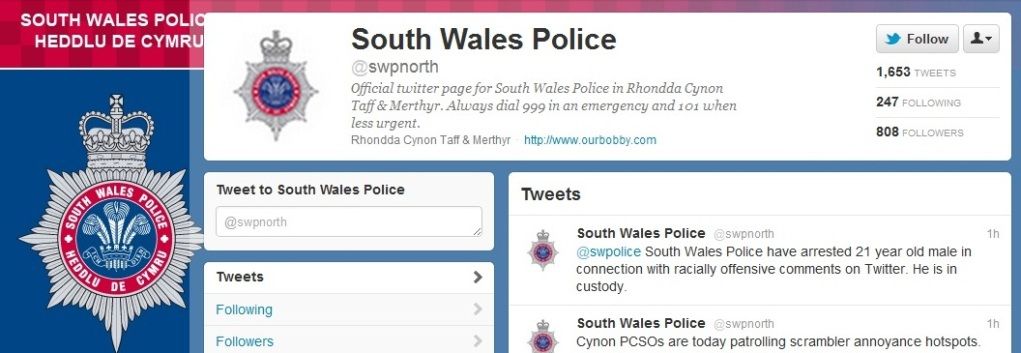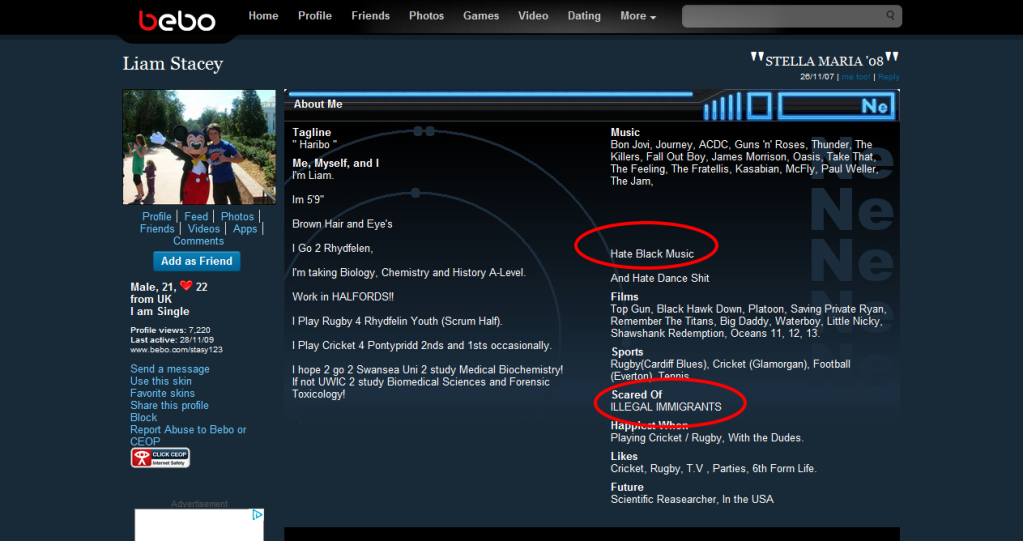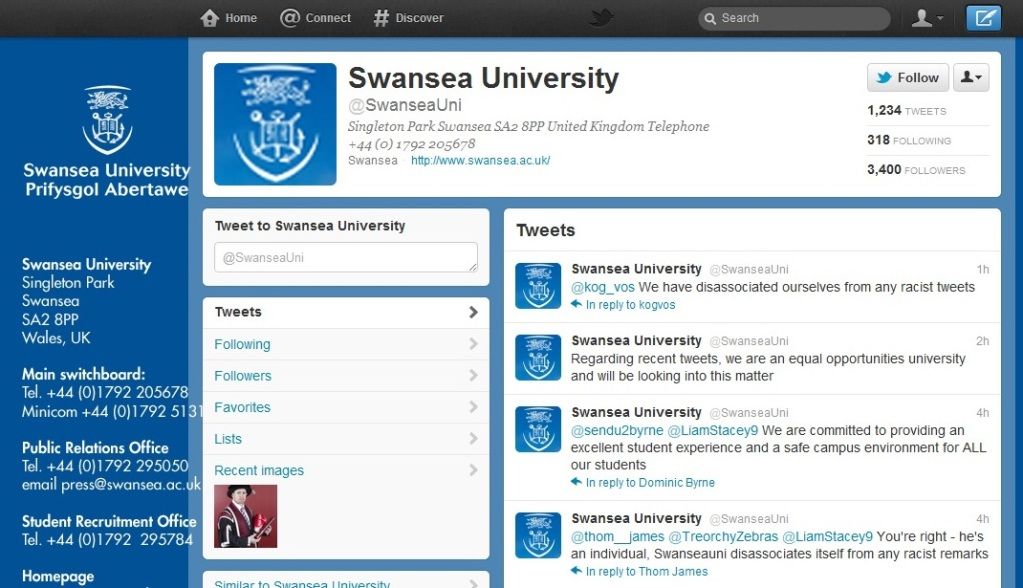When this blog got started, the intention was simply to use it as a place to park some photography and a few bits of personal writing. The name this is my england was chosen simply to denote that its contents would mainly be the personal observations about the blog owners's home country, whether picture form or in writing. No thoughts were ever entertained of the blog having any crusading role against wrongdoers of any kind.
But along the way, a few massively objectionable pricks have been encountered. Naming and shaming the worst of these for conduct not only horrible but illegal has felt like the right thing to do.
Liam Stacey: bang to rights
Nothing in the public domain seems to be available regarding the first of these, one Paul Brennan, a person who decided to abuse QPR defender Anton Ferdinand in the aftermath of the infamous on-pitch incident involving ex-England captain John Terry. But now it seems that yesterday's prick-of-the day, Mr. Liam Stacey of South Wales, has had his comeuppance:
Stacey, as many readers will know, is the idiot who racially abused Bolton's Fabrice Muamba while the player was still lying on the White Hart Lane pitch receiving treatment for a cardiac arrest.
With Stacey now in police custody, let's pause to consider everything he has put as risk by behaving so stupidly.
While Twitter, the medium that has got the Swansea University student in trouble this weekend, is currently enjoying the heyday of its popularity, some online social networking sites have fallen by the wayside. Liam Stacey used to maintain a profile on one of these, the now moribund Bebo. He has not updated his page since November 2009, when he was still a pupil at school in Rhydfelen.
As well as possibly shedding some light on young Liam's views on race ("Hate Black Music" "Scared of ILLEGAL IMMIGRANTS"), this Bebo profile tells us something of his hopes and dreams. Clearly, his plan to study medical biochemistry in Swansea came to fruition. But will his arrest and the possibility of a criminal record put a dent in his plans to be a scientific researcher in the USA? Time will tell. Either way, it's already the case that his university is aware of his actions:
So there's a warning here, kids. If you really must act like a hateful prick online, you'd better do it anonymously. Your behaviour online can have precisely the same consequences that terrible behaviour would have on the street. Perhaps a few more idiots need to feel the long arm of the law before this is widely realised. It would be fitting if the next such idiot to get a visit from the rozzers is Oliver Warren of Derby. Oliver is the berk who joked about the stricken Muamba yesterday and, when a young female tweeter remonstrated with him, wrote a threat of genital mutilation. All that can be said in his favour is that he did not use any racist language when making his 'jokes'. Just like Liam Stacey, Oliver Warren has deleted his Twitter profile.
Why do they do it?
When this blog first spawned a presence on Twitter, the microblogging site was a resource I had not used very much before. A few things quickly became apparent. Firstly, Twitter can be addictive. Secondly, it's possible to become quickly involved in really interesting exchanges of views with a mixture of friends, friends-of-friends and complete strangers, with the participants joining the discussions from all over the world. Another real benefit has been learning of breaking news stories or items of personal interest much faster than via any other source.
This is all upside. But there is a downside, of course.
Like no other medium, Twitter connects us instantly with sources of bile, hatred and ignorance of which we might otherwise have no knowledge. Many of us probably only encounter a really hateful, bigoted boor only very occasionally. Or perhaps we bump into people like that more often than we know. Maybe we cross paths with a real hate-monger every day. It could be that we remain blissfully unaware of quite frequent contact with really unpleasant people because, objectionable though their views may be to many, they are deterred from airing those views by two factors. The first of these would be the matter of social convention. After all, it's probably fair to say that the British are not the most demonstrative nation when it comes to sharing their views on politics and society among strangers and it could be that this habitual reticence is a barrier to our hearing fairly extreme stuff on a daily basis. In addition, if you're contemplating saying something to which (most) others may violently object, you need to ask yourself if you have the requisite courage for the altercation that could follow. Do you have the bravery and energy to take on those who will at least raise their voices in opposition? You'll even more courage in your convictions if you believe that fists as well as voices will be raised.
So perhaps it's the case that some degree of cowardice is what prevents all but the most committed or the most crazy of those who hold very challenging views from getting those views out in public.
But give them a computer or a mobile phone and all bets are off, it seems. Any loud-mouth can sound off on any topic. Often, to describe the language used as 'intemperate' would be to make an understatement of colossal proportions.
Sometimes these people really hold the views they share via their keyboards. With others, it's probably more a case of attention-seeking - looking to make the most outrageous remark possible and then get high on the thrill of seeing pissed off people responding. Almost any digitally literate person will be familiar with the idea of this kind of internet troll. As for Liam Stacey and Paul Brennan, we can't be sure if they are committed racists or just bloody fools engaging in what they believe to be 'banter'.
What, then, of the hardened troll? Whether believing his or her own schtick or not, the troll finds the courage to say online what he or she would never say in face-to-face contact with real human beings. The troll feels emboldened by the lack of actual physical consequences. There can be no slap or punch by way of rebuke. Also, let's assume that some online trouble-makers are not actually completely disinhibited sociopaths. If they are not, perhaps it is empathy that prevents them from behaving in the physical world as they do in the virtual one. If you make a remark designed to upset another person, you will see that person's feelings of hurt and anger in their eyes and mouth. You may feel a little of what they feel and realise how far you have gone. Online? Not so much. The physical reactions are just not there.
So the online troll does not feel the immediate consequences of the trolling. Both the upset faces and the raised fists are not experienced for real.
But there could be longer-term consequences, right? The person you've offended could find you and have it out in person. Or if your remarks have broken any laws about hate speech then you will find yourself in legal difficulties. Further, even if you're not actually risking arrest, you will have left a digital footprint. Anything you've written that would offend the sensibilities of the average person could linger online for much longer than you had intended. Applying for a job? These days many employers will Google the name of any applicant passing through the recruitment process. Thinking of running for public office? Maybe you want to be a parish councillor? Maybe you fancy yourself as the treasurer or entertainment secretary at your college or university? Well, someone will be running against you and that someone will have access to everything you've ever written online.
This is why the smarter troll acts anonymously, of course.
On Twitter, though, perhaps more than via any other online platform, some people say the most terrible things while using accounts that bear their own names and photographs. This particular medium seems to have an immediacy and a throwaway quality that leads some users to feel that they are not leaving a permanent and traceable record of their thoughts. This weekend, Liam Stacey has learned the hard way that he was labouring under a misapprehension when he figured that things said on Twitter would have no consequences for him in the real world.
So let's all wise up
So if you are a hateful bigot and you're keen to harness the power of the internet to spread your message, perhaps you should keep young Liam's plight in mind when planning your campaign.
Or if you're a mentally disturbed attention-seeking weirdo who enjoys upsetting strangers via your keyboard and mouse, ponder young Liam's fate when deciding how much of your real self you want to reveal.
Or if, as is much more likely, dear reader, you are a perfectly decent human being, Liam's troubles have a lesson for you too. The lesson is this - we don't have to put up with anything online that our sense of common decency would not allow us to tolerate on the street or in the workplace. Doubtless some people will come forward with a free speech argument in defence of people like Liam Stacey. But this is wrong. While everyone should be free to express opinions, even (and especially) very unpopular ones, it is a misuse of the word 'freedom' when it is applied to tolerating the cowardly bullying of arseholes - and a greater misuse still when applied to turning a blind eye to threats of genital mutilation as uttered online by the unlovely Oliver Warren.








 Back to TOP
Back to TOP
0 comments:
Post a Comment